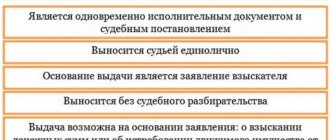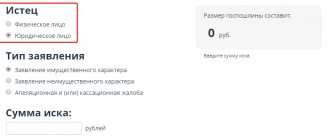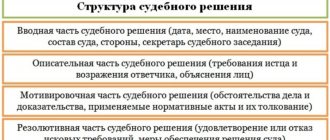An application for clarification of a court decision is submitted to the court, which considered the case on the merits and made this decision. Clarification is one of the ways to eliminate the shortcomings of the decision, ambiguity in its implementation, and possible inaccuracies. At the same time, the court does not have the right to essentially change the outcome of the consideration of the case under the guise of clarification. This rule was established by the Supreme Court of the Russian Federation, which was repeatedly expressed in the Determinations and Resolution of the Plenum of the Supreme Court of the Russian Federation dated December 19, 2003 “On the Judicial Decision.”
When to seek clarification of a court decision
An explanation of the decision is most often required in case of difficulties in its implementation. The persons participating in the case have the right to go to court (Article 34 of the Code of Civil Procedure of the Russian Federation), as well as the bailiff. The right to apply for an explanation of a court decision is secured by Article 202 of the Code of Civil Procedure of the Russian Federation. Explanation of a decision is allowed only before its actual execution. The period for filing such an application is also limited by the period for submitting executive documents for execution.
According to the Federal Law “On Enforcement Proceedings”, the period for submitting a writ of execution is 3 years. From the day the judicial act enters into legal force or the expiration of the period established when granting a deferment or installment plan for the execution of the court decision. Here we are talking specifically about enforcement of decisions. Court orders can also be submitted for execution within three years from the date of their issue. Enforcement documents containing demands for the collection of periodic payments may be presented for execution during the entire period for which the payments are awarded. And also for three years after the end of this period.
Was the Supreme Court's reversal of a decision on procedural grounds an accident?
Purely procedural violations extremely rarely become grounds for canceling judicial acts that have entered into legal force. As you know, there are unconditional grounds for cancellation, which represent such gross or significant violations of procedural legislation that the very fact of this violation allows one to doubt the legality of the judicial act (part 4 of article 270, part 4 of article 288 of the Arbitration Procedure Code of the Russian Federation) . Other procedural violations may lead to the cancellation of a judicial act only if they led or could lead to the adoption of an incorrect judicial act (part 3 of article 270, part 3 of article 288 of the Arbitration Procedure Code of the Russian Federation). These grounds for cancellation are differentiated in procedural legislation in relation to the appellate and subsequent cassation instances (meaning district courts). It is assumed that the most gross procedural violations should be corrected by the courts before the Supreme Court of the Russian Federation - in any case, those of an obvious nature. Although, unfortunately, procedural violations on the part of the courts of appeal and cassation cannot be ruled out.
Courts, as a rule, are reluctant to overturn judicial acts due to procedural violations only, even if they could really influence the court’s conclusions on the merits of the dispute, usually referring to them only in conjunction with an indication of violations of substantive law, often indicating more than one, but for a complex of procedural violations. This is most likely for cases of incorrect application of the rules of evidence. For example, if the rules on the burden of proof were violated, there is a high probability that the court would have reached different conclusions if the rules of procedure had been followed properly. However, the presence of such violations is not even easy to track. As a rule, when leaving a judicial act in force, only what, in the eyes of a higher court, supports the judicial act, indicates its correctness, and not what discredits it, is listed, even if the shortcomings are “not enough” to cancel the judicial act.
If unconditional grounds are identified (for example, failure to notify, non-signing of a judicial act by any of the judges, lack of a protocol), the reviewing court has no other choice. In judicial practice, there have been perhaps isolated cases when such violations reached the highest court. To prevent such situations, the Supreme Arbitration Court of the Russian Federation even explained in the Plenum dedicated to the review based on newly discovered circumstances that such violations by the cassation court can be attributed to newly discovered circumstances (so as not to deal with such obvious cancellations). For arbitration courts, this clarification is still valid.
Currently, procedural violations that directly fall under the definition of unconditional grounds for cancellation are still not so common. Much more often, situations arise when the court made a seemingly gross error in the application of the rules of procedure, which does not directly relate to such grounds, but in terms of the significance of the violation approaches them. Therefore, it is important to understand: due to the procedural violation itself, per se, the judicial act is subject to cancellation or is an assessment required by the court as to whether this led to the adoption of an incorrect judicial act?
For practice, it may be relevant, firstly, to interpret the unconditional grounds for cancellation, since it is not always obvious whether certain violations relate to them. So, for example, in the Determination of the Constitutional Court of the Russian Federation of April 3, 2014 No. 656-O, at the request of the Fifteenth Arbitration Court of Appeal, the question of the interpretation of such an unconditional basis for o, having constitutional content, was considered in relation to the procedure for replacing judges.
Secondly, you need to understand whether the list has actually expanded, i.e. whether new grounds for cancellation have appeared in judicial practice, which, in fact, are unconditional, although they are not named as such in the law.
Such a basis can be considered, for example, the discrepancy between the operative part of a judicial act and the declared one (both in full and in part). This basis for cancellation has appeared in the practice of the Supreme Arbitration Court of the Russian Federation since the audio recording of a court hearing became mandatory and official.
There are such cases in the practice of the SKES RF Armed Forces at the present time. For example, definitions dated April 6, 2021 No. 305-ES16-17903 and July 21, 2021 No. 305-ES17-3225.
Thirdly, we can consider the question of what procedural violations are, although not unconditional grounds for the cancellation of judicial acts, but so significant that they still entail cancellation. It can be assumed that it is precisely such situations that the legislative formula “could lead to the adoption of an incorrect judicial act” is designed for, but such violations can conditionally be designated even as “intermediate” (between unconditional and other exclusively procedural grounds for cancellation). We believe that this applies to cases where the nature of the violation is such that it inevitably raises doubts in a legal and reasonable judicial proceeding and is not consistent with the objectives of the legal proceedings (see Article 2 of the Arbitration Procedure Code of the Russian Federation). It seems that the most gross procedural violations that can be classified as such are associated with a violation of the right of the persons involved in the case to judicial protection of their rights and legitimate interests.
It should be noted that any individual violation of the rights of the persons participating in the case in itself can hardly be grounds for cancellation. The procedural law provides only the criterion “it led or could lead to the adoption of an incorrect judicial act.” The grounds for the cancellation of judicial acts by the Judicial Collegium of the Armed Forces of the Russian Federation in the Arbitration Procedure Code of the Russian Federation, by analogy with the Code of Civil Procedure of the Russian Federation, seem to include the need to restore and protect violated rights in the case of procedural violations, too, but through the conjunction “and” with the criterion “influenced the outcome of the case.”
These norms are intended to draw attention to the fact that no matter how sad the violation of the procedural rights of the complainant may be, it does not in itself entail the cancellation of the judicial act that resulted from the consideration of the case in which violations were committed. However, the degree of such a violation, in our opinion, should still be taken into account by the courts, and the Supreme Court of the Russian Federation directs the courts towards this.
In the recently adopted Determination of the SCES of the Supreme Court of the Russian Federation of August 21, 2017 No. 305-ES17-7914, the basis for cancellation was the fact that the appellate court made a decision on the merits of a separate dispute, without having the volume of the case in which there was evidence presented by the procedural the opponent of the bankruptcy trustee - an individual - the applicant of the complaint to the Supreme Court of the Russian Federation.
This definition contains an indication of the significance of the violation and the fact that it could lead to the adoption of an incorrect decision on the merits, although without reference to a specific norm of the Arbitration Procedure Code of the Russian Federation. However, it also contains an indication of a significant violation by the courts of appeal and cassation of the applicant’s right to judicial protection. We believe that it could be supplemented by a reference to a violation of the fundamental principles of legal proceedings (primarily such as equality and competition).
Therefore, what at first glance may appear to be a technical error or negligence on the part of the court may have much greater legal significance if it is a violation of the fundamental principles of the judicial process. And the reaction of the Supreme Court of the Russian Federation in the form of canceling judicial acts on this basis is important, since it is intended to draw the attention of the courts to the inadmissibility of ignoring the basic rights of participants in the process, and to the delimitation of procedural violations, the presence of which is critical for assessing the legality and validity of a judicial act. At the same time, it is significant that this violation is not directly related to the application of substantive law and judicial acts are canceled regardless of whether the courts were right on the merits. Therefore, a study of the essence of the dispute in relation to this issue is not required.
As other examples of purely procedural and gross violations in the practice of the SCES of the RF Armed Forces, the following can be cited:
– the district court’s reversal of the decision against which the applicant filed a complaint (not the judicial acts on the merits of the dispute were appealed, but the judicial acts relating to the explanation of the court decision), although in this case the violation was qualified as the court going beyond the powers granted to it by law , i.e. an independent procedural basis for cancellation, different from those listed in parts 3 and 4 of Art. 288 Arbitration Procedure Code of the Russian Federation, – Determination dated August 17, 2021 No. 308-ES17-6692;
– an error in indicating the address of the court organizing video conferencing, which is qualified as improper notification, – Determination of March 30, 2021 No. 305-ES16-20857.
Thus, the most gross procedural violations that entail a clear violation of the rights of the person involved in the case, which run counter to basic procedural principles, should be recognized as grounds for the annulment of judicial acts, although the degree of need to evaluate their consequences according to certain criteria may vary in each specific case . Sometimes such violations are more obvious, sometimes less, which also raises doubts about the possibility of generalizing such cases in the form of an official explanation of the Supreme Court of the Russian Federation. In addition, they are varied and unpredictable, in any case, they are in the nature of exceptions to the rule, which - bearing in mind the cases submitted to the Supreme Court of the Russian Federation - was either allowed by the district court as a cassation instance, or was ignored by lower courts. Therefore, the question in this area is often posed not as “is it permissible or not,” but as “how significant is this,” although, of course, courts must comply with any (all) procedural rules in their activities.
How to draw up and submit an application to the court
The text of the application must describe in detail what the shortcomings of the court's decision are. And why exactly is the applicant asking for clarification of the decision (how the ambiguity affects the rights and obligations of the person). The applicant does not pay the state fee when applying to court. In addition to court decisions, clarification of other judicial acts can be submitted in a similar manner.
After receiving an application, the court, as a rule, does not schedule a hearing. And, accordingly, it does not notify about the fact of clarification of the party’s decision. The court considers the application within 10 days from the date of receipt of such an application. However, if necessary, the court may schedule a hearing. However, the failure of the parties to appear at the court hearing is not an obstacle to consideration of the issue.
Based on the results of consideration of the issue of clarification of the decision, the court issues a ruling by which it clarifies the court decision or refuses to satisfy the application. The court sends the ruling to the participants in the case within 3 days. Any interested person (participant in the case) may appeal such a court ruling by filing a private complaint against the court ruling to the appellate court.
Cases of issuing an additional court decision should be distinguished from clarification of a decision.
FAQ
Difference between clarification and additional judgment
These two processes are very similar and are often confused. An additional court decision is regulated by Art. 201 Code of Civil Procedure of the Russian Federation and Art. 178 of the APC, and both articles explain that this is not a correction of inaccuracies, but the establishment of several important points that for some reason were not voiced at the main meeting:
- Consideration of a separate claim that was supported by evidence, but was not taken into account by the court when passing a sentence;
- The court resolved disputes about the right, but did not pay attention to the amount of recovery, actions to resolve the conflict, or specific property that must be recovered in favor of the victim;
- The amount of legal costs was not specified.







